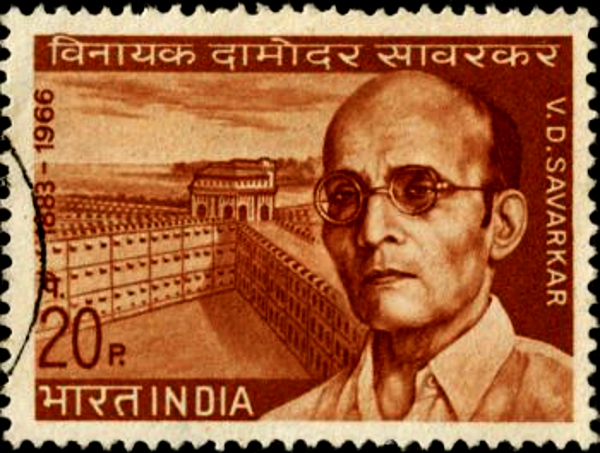In this election season, Vinayak Damodar Savarkar, whose 136th anniversary was celebrated on Tuesday, has once again been at the centre of the heated ideological debate over the future of India. The move of the Congress government in Rajasthan to remove Veer Savarkar from the textbooks has intensified the row over his legacy. There is little doubt that demonising Savarkar is usual behaviour for his ideological opponents. But Savarkar, the formulator of the Hindutva, can’t be reduced to rhetorical politicking. His legacy needs to be seriously engaged with because he is one of the pivotal persons in the country’s history. He, like everyone, was the product of his times. The main challenge thrown by the British rule and colonial modernity under the pale of capitalism was for Hindus to justify their existence as a society. Who were they? Tamil, Bengali, Punjabi, Marathi? Jat, Brahmins, Ahirs, Pasi, Rajputs, Vokkaligas? What the modern world posed was an entirely new sociopolitical challenge for Hindus. Could Hindus survive in a modern world dominated by the expansionist organised religions, nations and nation-state?
Savarkar responded to these challenges. The coming together of various pagan traditions as Hinduism to meet the challenge of the Abrahamic monotheism is a centuries-old process. Savarkar consolidated it under a new ideological construct. He wielded it into a coherent political construct, Hindutva that aimed to answer the challenges of the modern world, especially the charge of the colonialists that India is not a nation and hence unworthy of self rule. Savarkar gave the first systematic Hindu political response to the repeated invasions and subjugation of India. Hindutva is not Hinduism but a political response to political Islam and western imperialism. In the Huntingtonian paradigm, Hindus had substance but not the salience — i.e. Hindus had a sense of who they are but a weaker sense of who they are not. Savarkar provided that salience and equipped Hindus with the clarity which, unlike others, they lacked.
Savarkar understood that for India to survive in the modern world, it has to become a modern nation too. He also understood that unless India becomes an industrial power with the modern means of waging war, it simply can’t resist the imperialist powers. But he understood something more that several of his nationalist contemporaries failed to grasp. He understood that India can’t become a nation as long as it remains a feudal-agrarian society disintegrated into numerous castes and communities. The superiority of the political construct of a nation and nation-state lies in its ability to mobilise people on an unprecedented scale, down to the last rung to achieve definitive objectives, be it war or peacetime industrialisation. Savarkar disagreed with the orthodox advocates of the caste system as a defence mechanism because what may be true for a bygone era was not true when faced with an opponent organised under a nation-state, bringing to bear its full might upon a divided people.
For India to be able to resist imperialism, a nation had to be born. For Savarkar, that nation was a Hindu Rashtra. Only a Hindu nation transcending caste, regional and linguistic barriers was capable of resisting imperialism. No longer would invading armies roam around the countryside; no longer would India be a playground for colonial powers; no longer would its people and cities be pulverised by warlords for they would have to face a powerful Indian state created on the foundation of a Hindu nation. And the foundation of this Hindu nation was Hindutva.
Savarkar was a radical and his Hindutva, too, was a radical break in Hindu thought: anti-caste, reformist, modernist and futuristic. It was a modern Hindu response to the modern world. In fact, even today, Hindutva is opposed by regressive sections of the Hindu society that cling on to the upper caste village orthodoxy and delusions of restoring the feudal-agrarian social order.
Savarkar suffered terribly at the hands of the British for his revolutionary activities and was later boycotted by society for opposing untouchability, caste rules and advocating widow remarriage, and intercaste dining. It is a pity that he has been reduced to a hate figure. One should seriously engage with his views and legacy even if one disagrees with him. After all, after Chhatrapati Shivaji Maharaj, Savarkar remains the most consequential Hindu. Where would the Hindu polity be today without them?
Source:HT
Image Courtesy:Wikipeadia
You may also like
-
India Can’t Afford to Remain Stagnant at this Juncture, Says PM Modi; Asks People to Buy Locally-Made Goods
-
Stolen Artefacts to be Returned to India from Scotland Museums
-
Legendary Singer Lata Mangeshkar Passes Away At the Age of 92
-
Netaji’s Hologram Statue at India Gate
-
10th Century Stone Idol of Goat Head Yogini IllegallyRemoved from A Temple in Lokhari, Banda, UP Being Returned to India
